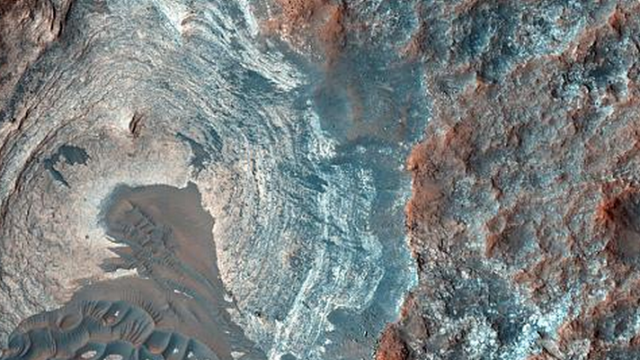Over on reddit, an awesome AMA between readers and NASA Mars scientists plumbs deeper into today’s flowing water announcement. Here’re the highlights.
The reddit AMA included participants from NASA’s Mars Reconnoissance Orbiter (MRO) as well as their Jet Propulsion Lab (JPL):
- Rich Zurek, Chief Scientist, NASA Mars Program Office; Project Scientist, Mars Reconnaissance Orbiter
- Leslie K. Tamppari, Deputy Project Scientist, MRO
- Stephanie L. Smith, NASA-JPL social media team
- Sasha E. Samonchina, NASA-JPL social media team
The NASA team answered users’ questions on the discovery of flowing water on Mars, and what that means going forward.
Reddit user fisheez:
It was shown back in 2011 that salt water flows may be a seasonal occurrence. What was the final proof for the team that this was happening, and what was your initial reaction to the data?
NASAJPL:
With MRO, we were able to observe a few of these sites at various points within the Mars year, and again the next year. Over time, we saw that the streaks darkened and lengthened during the warm season and faded during the cold season. A benefit of having MRO lasting so long is that we’re able to see changes and patterns over time.
My reaction? This is all very exciting! The closer we look at Mars, the more interesting it gets. — LT
Reddit user Iymbryl:
How much liquid water are we talking about? Like.. tap water leaking when you don’t close the valve tight enough, or Niagara falls?
NASAJPL:
Tap water leaking. -RZ
Reddit user MCCJT2011:
From my fourth grade students (edited by me for clarity):
Could there be Martian life in the water since it’s only there at certain times of the year? What might happen to the life when the water disappears?
It was mentioned that there’s life on Mars in the form of microbes on the machinery. Is it possible that these microbes sent by us could harm Martian life?
NASAJPL:
It’s possible. We know of forms of life that hibernate during dry seasons on Earth. The water that we’re seeing within the RSL (the seasonal dark streaks that we’re seeing on slopes on Mars) is salty. Salty water could be harmful to life.
We don’t know what Earth life could do to any potential life on other worlds. That’s why we try to clean our spacecraft very carefully. — LT
Reddit user shutuptoby:
Is there any evidence of evaporation happening on mars? And do you know where this water came from?
NASAJPL:
New impact craters on Mars sometimes have bright ice exposed in the bottom of the crater. This goes away over a few months. The ice, when exposed, is going from solid to vapour. Evaporation of a briny flow will also occur, so the water needs to be resupplied. We don’t know how. -RZ
Reddit user Jjalldayque:
If the Mars rover were to travel to the site of the briny water, what would be the scientific procedure for determining if that water supports life?
NASAJPL:
The Curiosity rover does not have life detection instruments. It would look for confirmation that liquid water was present and how long during the day it was liquid. -RZ
Reddit user Mute_Moth:
In the articles I’ve read so far, the water is referred to as “briny” and that it’s more fluid than it is water. What does that mean? Would this be something theoretically possible to drink or grow things with? Or would this be the kind of thing that would need purification before it could be used?
NASAJPL:
The salts in the water appear to be perchlorates, so I wouldn’t want to drink the water. To be a future resource for humans, you would want to remove the salts. -RZ
Reddit user _From_The_Internet_:
What does this mean in regards to possible life?
NASAJPL:
We think liquid water is essential for life (at least as we know it.) That does not mean that life is there; but, it’s a good place to look. -RZ
Reddit user robsquad:
what would be the procedure, if life is found on Mars? would the public be made aware? who gets told first?
NASAJPL:
Information flows to the public very quickly. If one of our missions here at JPL detected life, we’d notify NASA headquarters immediately, who would then follow procedures to notify the US government and the public. — SLS
Reddit user DarkContractor:
How long into the future do you think it will be before we can realistically think about sending humans to Mars?
NASAJPL:
Presently, NASA is looking into the possibility of sending humans to the vicinity of Mars in the early 2030s. In this scenario, the earliest humans to the surface would be in the late 2030s. -RZ
Reddit user Sir_Azrael:
Why should the average joe care about this? What does this mean for science and space exploration?
NASAJPL:
Liquid water, even if very salty, is still a good place to look for life forms. We don’t know how robust martian life (if it exists) could be. Also, water in any form is a resource that future missions could exploit. -RZ
Reddit user yeagerbomb16:
What’s the next step?
NASAJPL:
The next step is to look for more locations where brine flows may occur. We have covered 3% of Mars at resolutions high enough to see these features. -RZ
Now that you’re an expert on the Mars announcement, you should check out the rest of the AMA. There’s a lot of great conversations and info about Mars, and the team has said they will continue to answer questions over the next few days. Consider getting out your jokes about The Martian in the comments before you head over there.
Image credit: NASA/JPL-Caltech/University of Arizona
